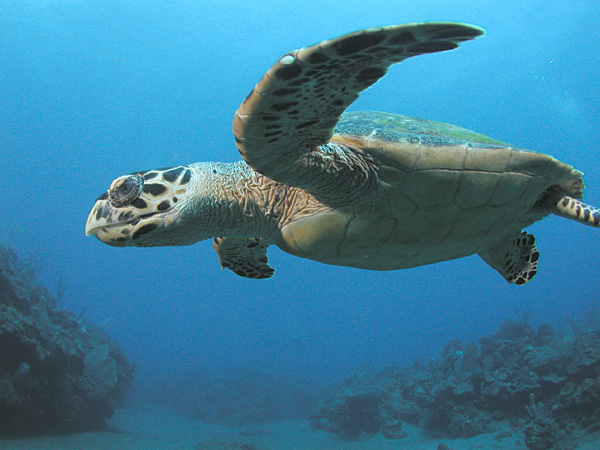BZS Urges Caution To Avoid Injuring Turtles
With the Cup Match weekend rapidly approaching and summer well under-way, the Bermuda Zoological Society (BZS) and the Bermuda Aquarium, Museum and Zoo, a section within the Department of Conservation Services, urge everyone to take the time to do all we can to reduce our impact on turtles living around Bermuda.
The appeal for caution was raised after the Bermuda Turtle Project staff received a recent report about some individuals in a boat zooming round and round a small turtle in Ely’s Harbour, then jumping overboard and catching the turtle, handing it around the group and having photos taken with it before they put it back in the water. Bermuda Turtle Project Coordinator Mark Outerbridge said: “We would like to remind the public that the turtles are protected and should not be harassed in any way.”
The two most commonly encountered sea turtles in Bermuda waters are the green and hawksbill, the latter having been listed by the World Conservation Union as ‘Critically Endangered’ world-wide.
-
Since 1972, all turtles in Bermuda have enjoyed complete legislative protection which prohibits direct harvesting and intentional harm; however, accidental and incidental causes still contribute to local mortality.
BAMZ has been keeping records on all of the stranded turtles (those found dead, sick or injured) that have been brought in or reported by members of the public since 1983.
Over the past 27 years a total of 424 turtles have been admitted, many due to human actions and activities. Entanglements in monofilament fishing line, discarded nets, rope and string, as well as boat collisions or propeller injuries are two very common causes of turtle strandings.
The good news is that it is that these occurrences are largely preventable. BZS and DCS therefore urge everyone, especially during this Cup Match weekend, to take the time to consider the following actions:
- If you are on the water boating, please pay attention while in locations frequented by turtles – for example, over seagrass meadows – and drive slowly when you are within 100m of the shoreline, or in an area where turtle warning signs are posted. Wearing polarized sun glasses will also help to make turtles resting at the surface more visible to boaters.
- If you are out fishing, please discard unwanted fishing line properly rather than throw it into the ocean, and make an effort to recover any line that is broken off or has become entangled in the marine environment when you encounter it.
- Try to avoid the use of helium balloons and do not pollute the ocean, especially with plastic bags, since both of these can be mistaken for food by turtles. When turtles ingest these materials they can lead to serious health complications.
BZS said a little bit of extra effort can go a long way to reducing that annual admission rate of stranded turtles into Bermuda Aquarium, Museum and Zoo as well as the number of turtle deaths around Bermuda.
The document below shows both a map illustrating where cautionary ‘Turtle Alert’ signs have been posted, and photos [which we warn may be distressing] showing a green turtle that was hit and killed by a boat, green turtle that drowned because it became entangled in a discarded net and a juvenile green turtle which was strangeled and drowned after becoming entangled in monofilament fishing line.
Read More About
Category: All, Environment, News



Comments (1)
Trackback URL | Comments RSS Feed
Articles that link to this one: